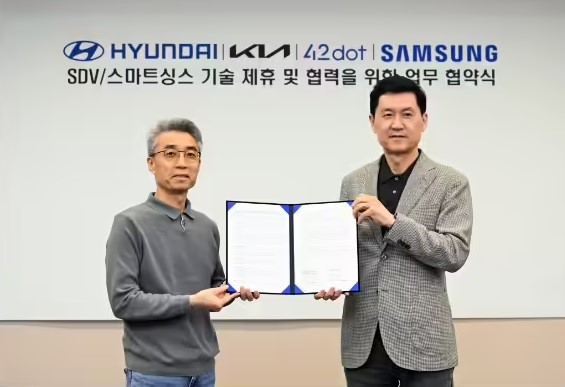In the context of the rapid development of smart cars and autonomous driving technology, autonomous driving chips have become the "intelligent brain" of automobiles It directly affects the computing efficiency, real-time response ability and energy efficiency performance of the autonomous driving system. In 2024, Hyundai Motor and Samsung Electronics will enter into a strategic cooperation to jointly develop autonomous driving chips based on the 5nm process. This cooperation not only represents the deep integration of the two companies in the field of autonomous driving, but also injects new momentum into the intelligent process of the global automotive industry, marking the further close integration of semiconductors and the automotive industry.
Background and motivation for cooperation
Hyundai Motor's technology layout in the field of autonomous driving began many years ago, and with the continuous advancement of technology and the increase in market demand, Hyundai established the "Semiconductor Strategy Office" as early as 2022 The goal is to independently develop high-performance chips and reduce dependence on external suppliers. However, in the face of rapidly changing technological iterations and increasingly fierce competition in the industry, Hyundai Motor realized that it was difficult to break through the technical bottleneck in the short term by relying on its own R&D alone, so it sought a strong partner. Samsung Electronics is an ideal partner for its technology and market leadership in semiconductor manufacturing.

Pictured: South Korea's Hyundai Motor will collaborate with Samsung Electronics on a 5nm autonomous driving chip
Technical details and market prospects
The core of this collaboration is the use of Samsung Electronics' 5nm SF5AProcess technology for the production of chips for autonomous driving. Compared with traditional processes, the 5nm process can integrate more transistors in a smaller chip area, greatly improving the computing power and energy efficiency of the chip. This advancement is particularly critical for autonomous driving systems, as they can process large amounts of real-time data to ensure accurate and timely driving decisions. Taking Tesla's FSD chip as an example, the performance improvement after adopting the 7nm process has been more than tripled, and the introduction of the 5nm process will further accelerate technological progress.
In addition, 5nm technology also has significant power consumption advantages, which can effectively reduce the energy consumption of chips and extend the range of electric vehicles, enhancing the market competitiveness of electric vehicles. In the future, with the popularization of autonomous driving technology and the growth of in-vehicle computing demand, the size of the global autonomous driving chip market is expected to exceed 29 billion US dollars by 2030.
Industry perception and industry impact
Hyundai executives have high hopes for this cooperation, believing that the cooperation with Samsung Electronics will help Hyundai accelerate the development of autonomous driving chips and significantly shorten the product development cycle from R&D to market. At the same time, Hyundai also expects to establish a stable supply chain of autonomous driving chips through this cooperation, further reducing the risk of future market fluctuations.
From an industry perspective, this collaboration has not only attracted a lot of attention from the industry, but also sparked a wide range of discussions. Experts generally believe that the in-depth cooperation between Hyundai Motor and Samsung Electronics will play a positive role in promoting the further development of autonomous driving chip technology and accelerating the popularization of autonomous vehicles around the world. At the same time, this cooperation provides a new paradigm for other automakers and semiconductor companies, which may lead to more cross-industry cooperation and promote technological innovation and industrialization of the autonomous driving industry chain.
Challenges and future prospects
Although Hyundai's cooperation with Samsung Electronics is promising, it still faces some technical and market challenges. First of all, the R&D and production of autonomous driving chips require huge capital investment, including chip design, manufacturing and post-testing, which requires effective collaboration and planning between the two parties in terms of capital investment and cost control. Secondly, the continuous progress of autonomous driving technology has put forward higher requirements for the computing power and data processing speed of chips, and with the increase in demand for intelligence, future chip technology must continue to innovate and make breakthroughs.
Looking ahead, with the continuous development of technology, the cooperation between Hyundai Motor and Samsung Electronics will make important technological breakthroughs in the field of autonomous driving chips and promote the popularization and application of autonomous vehicles. By further integrating Hyundai Motor's automotive design and Samsung Electronics' semiconductor manufacturing technology, the two companies are expected to provide more efficient, safe, and reliable technology solutions for future smart mobility.
Conclusion
The cooperation between Hyundai Motor and Samsung Electronics is not only an in-depth alliance between the two industry giants in the field of autonomous driving chips, but also an important milestone in the technological development of the intelligent car era. Through this partnership, Hyundai Motor will be able to leverage Samsung Electronics' advanced 5nm technology to break through existing technical bottlenecks and accelerate the development and application of autonomous driving chips. The far-reaching significance of this cooperation goes far beyond simple inter-enterprise collaboration, it provides technical support for the intelligent transformation of the entire automotive industry, and also promotes the globalization of autonomous driving technology. In the future, as the two parties continue to deepen cooperation in the field of autonomous driving, it is expected to bring consumers a more intelligent and safe driving experience, and promote the global automotive industry to move towards intelligence and efficiency.






